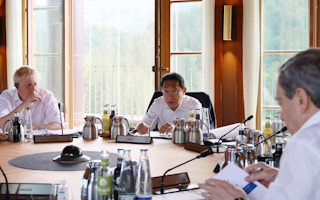As leaders of the G7 countries convene at the 48th G7 Summit, expectations are rife for announcements on ambitious climate policy that could have far-reaching impacts for the world. The G7 has displayed a clear commitment to retain its focus on climate, with the Climate, Energy and Environment ministerial committing to decarbonising the electricity generation sector by 2035 in a communique that was released in May 2022. With the opportunity to take over the G7 presidency next year, Japan can continue the pressure from and within the G7 nations to follow up on climate commitments and action.
However, Japan’s national climate and transition plans will be subject to scrutiny for its lack of commitment on a coal phase-out, its renewable energy ambition, and its reliance on technologies such as ammonia co-firing and carbon capture and storage (CCS).
Japan’s current targets under its Sixth Basic Energy Plan are not aligned with the targets recommended by the International Energy Agency (IEA) report on roadmaps for the G7 members to achieve net-zero electricity sectors. Japan’s targets lag behind other members of the G7: 36 to 38 per cent renewable power by 2030 as opposed to a 60 per cent target recommended by IEA, and an 80 per cent target in place in Germany for 2030. Outcomes of the G7 Climate and Energy ministerial, which includes the commitment on electricity sector decarbonisation, will require domestic policy changes. Even within Japan, businesses and investors are requesting the government to increase its ambition on energy transition in order for the country to retain its competitiveness globally, as seen from a recent message from the Japan Climate Initiative to the government.
Domestic and international stakeholders are looking for Japan to urgently address policy gaps that are hindering the advancement of renewable power such as reducing grid access costs, prioritising renewable energy in dispatch, improving transmission infrastructure, and fixing market constraints that do not support smaller renewable power generators. Businesses are taking the lead on decarbonisation in Japan through initiatives such as RE100, as are investors through their engagement with portfolio companies via initiatives such as Climate Action 100+ and the AIGCC Utilities Engagement Program. They look to the government to support these efforts by implementing policies that clearly signal decreasing dependency on nuclear and thermal fossil fuel-based energy, and to ensure higher renewable energy integration by providing adequate incentives and implementing system reforms before Japan starts losing its competitive edge on investments.
In the meantime, ammonia co-firing is poised to play a central role in power sector decarbonisation in Japan, based on plans of the domestic electric utility companies and the government ministries. This is in contrast to the Intergovernmental Panel on Climate Change (IPCC) Working Group III report on mitigation of climate change, which identifies a role only for carbon-neutral ammonia in a country’s energy mix and only for those sectors that are hard to electrify.
Large scale deployment of ammonia co-firing in the power generation sector, particularly with ammonia generated from fossil fuel, will not yield the required results on emission reductions this decade. It might also prolong the use of coal-fired power plants and divert capital from effective clean energy projects. With targets of roughly 20 per cent ammonia co-firing by 2035 based on utilities’ plans, and efforts to further develop technology to use 100 per cent ammonia in the 2040s, the emissions burden over the next decade remains high. Coupling this with the falling cost of solar PV and wind power generation, including battery storage, it is not likely that any form of ammonia co-firing will be able to compete with the long-term cost benefits of renewable energy for Japan’s energy mix and its consumers.
Japan is currently planning to source blue ammonia — ammonia generated from fossil fuel with CCS technologies. However, producing blue ammonia may create substantial lifecycle emissions from fugitives lost during the extraction of gas and uncaptured carbon during the CCS process. Import of ammonia produced from fossil fuel sources raises the concern of businesses accountability for Scope 3 emissions and associated carbon prices, a concern for investors. Japan’s significant focus on ammonia co-firing, which has yet to prove scalable, has caught international attention too, as seen in the joint climate resolutions filed by AIGCC member Amundi with other institutional investors at J-Power, Japan’s largest operator of coal-fired power plants.
Japan has historically had a tremendously significant leadership role on bringing scalable technology to the market and making it available to the world. At COP26 last year, Japan pledged to support Asia’s transition to zero-emission power generation. However, the types of technology support being planned for Asean nations, such as ammonia co-firing and CCS through regional initiatives and bilateral aid, have raised questions. As the sole Asian member of the G7, Japan’s leadership is an opportunity to provide pivotal direction for the supply of climate finance and access to future-proof technology to support the transition efforts that are underway in the region.
This is a decisive decade for action on climate change, and the hope is for Japan to step up its ambition on climate commitments domestically, post this year’s G7 Summit and beyond. Investors are increasing engagements with companies on setting emission reduction, targets which translates to increased demand for government support on proven clean energy technology. The business and investment communities will welcome and support the Japanese government as it takes over G7 leadership in 2023 and pursues higher transition ambitions.
Jane Ho is director of investor practice and Anjali Viswamohanan is senior policy manager at the Asia Investor Group on Climate Change (AIGCC). AIGCC is an initiative to create awareness and encourage action among Asia’s asset owners and financial institutions about the risks and opportunities associated with climate change and low carbon investing.



















